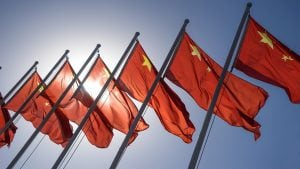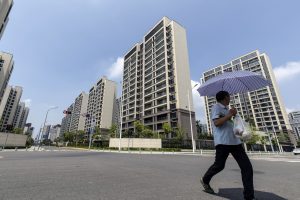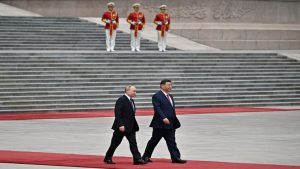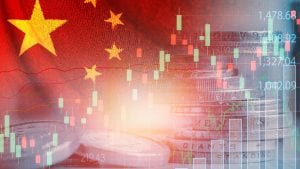China rolls out new measures to fix its property crisis, spur growth
Summary
China announced a slate of fresh measures to revive its tottering property industry after latest data showed that housing prices had slumped greatlty since the start of the year.
China announced a slate of fresh measures Friday to reinvigorate its ailing property industry after the latest data showed housing prices have slumped nearly 10% since the start of the year.
Among other things, the central bank said it would reduce the minimum down payment for mortgages and remove the floor on interest rates for first and second homes.
China’s housing market has slumped after a crackdown on excessive borrowing by property developers several years ago, dragging along a wide range of other businesses — such as home furnishing, appliances and construction — and slowing growth in the world’s No. 2 economy.
Dozens of developers, whose legions of high-rise apartments have transformed urban landscapes across China, have defaulted on their debts. Many projects have just stalled, unfinished.
He Lifeng, a vice premier, said officials would roll out policies to suit each city and “fight the tough battle of dealing with the risk of unfinished commercial housing.”
“We will solidly advance key tasks such as guaranteed housing delivery and absorption of existing commercial housing,” the official Xinhua News Agency cited He as telling a top level teleconference on property policies.
The effort to entice more families to buy homes has gained momentum after earlier moves such as interest rate cuts and government-backed financing failed to lure buyers into the market at a time when developers are struggling to deliver housing already promised and paid for.
Housing is a mainstay of investment for Chinese, given the low level of interest rates paid by banks, and many potential buyers might be waiting for the market to bottom out before considering new purchases. Also, layoffs and other disruptions from the pandemic have left many people wary of spending.
The announcement by the People’s Bank of China said that effective Saturday, the interest rate for first-time housing provident fund loans for under 5 years will be cut by 0.25 percentage point to 2.35%. The rate for loans over 5 years was reduced by 0.25 percentage point to 2.85%.
Minimum down payments for loans for first homes will be 15% of the purchasing price. For second homes, it will be 25%, it said.
The latest efforts, which take the down payment levels and mortgage interest rates to historic lows, show Chinese leaders are determined to stabilize the real estate market, Chen Wenjing of China Index Holdings, a Nasdaq-listed company specializing in information about China’s real estate market, said in a report.
“Reducing the down payment threshold and home purchase costs for residents will likely boost their willingness to buy homes,” Chen said. If major cities follow up with related measures, that will likely improve market sentiment even more, he said.
Also Read: North Korea test-fires a ballistic missile a day after US, South Korea conduct a fighter jet drill
Officials should focus on ensuring home buyers get what they paid for, and when that is impossible the courts may need to get involved, said Dong Jianguo, vice minister of Housing and Urban-Rural Development.
“In judicial proceedings, protecting the legitimate rights and interests of homebuyers should also be a top priority,” Dong told a news conference in Beijing.
Earlier Friday, officials of the National Bureau of Statistics acknowledged that domestic demand — spending by consumers and businesses — remained “insufficient” and said the government was considering further ways to revitalize the property industry after housing prices sank 9.8% in January-April from a year earlier.
“The complexity, severity, and uncertainty of the current external environment are significantly increasing. There is insufficient effective domestic demand, high business pressure, and many risks and hidden dangers,” said Liu Aihua, a spokesperson for the bureau.
“The foundation for recovery needs to be strengthened,” Liu said.
One of the key strategies being rolled out involves local governments buying apartments that have going unsold due to weak demand, to be rented out as affordable housing in trial programs that appear to have become national policy.
As part of the latest policy relief, the central bank said it is setting up a 300 billion yuan ($42 billion) fund to finance purchases of unoccupied housing by state run companies and local governments for use as affordable housing.
China’s economy grew at a robust 5.3% rate in the first quarter of this year, but that is relatively slow for a developing economy, and signs of weakness have persisted.
The report Friday by the National Bureau of Statistics showed factory output was up 6.7% in April from a year earlier and investment in fixed assets such as factory equipment climbed 4.2%.
But housing starts fell almost 25% year-on-year and sales as measured by floor area were down 20%. Financing for property projects fell 25%.
Retail sales rose only 2.3% in April.
Officials said they expected demand to rebound as the government carries out policies aimed at getting households to sell off old cars and appliances and buy new ones.
Also Read: Many pyramids in Egypt, Giza were built along crucial branch of River Nile: Reveals study

Elon Musk forms several ‘X Holdings’ companies to fund potential Twitter buyout
3 Mins Read
Thursday’s filing dispelled some doubts, though Musk still has work to do. He and his advisers will spend the coming days vetting potential investors for the equity portion of his offer, according to people familiar with the matter









 Listen to the Article
Listen to the Article  Daily Newsletter
Daily Newsletter











